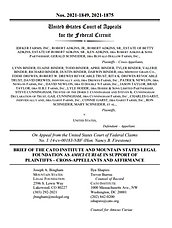Learn more about Cato’s Amicus Briefs Program.
In 2004, the United States Army Corps of Engineers folded to outside pressures (including a court order) and refocused its Missouri River Basin water control efforts on endangered species protection, deprioritizing its decades-old program of maintaining its infrastructure for the benefit of farmland and other economic activities along the Missouri’s riverbanks. That resulted in renewed flooding of the land, subverting the reasonable investment-backed expectations of hundreds of farmers who staked their livelihoods on the realistic calculation that the Corps would continue to maintain the land for the original purpose. Ideker Farms is one of dozens of land owners who brought suit against the federal government for basically taking their land through flooding. There’s even a website where you can follow the case.
Under the Fifth Amendment’s Takings Clause, the federal and state governments must pay “just compensation” for taking private property for public use. What qualifies as just compensation varies depending upon the circumstances. The Supreme Court has set some baseline rules. In the otherwise flawed decision in Penn Central Transportation Co. v. New York City (1978), the Court held that in deciding whether a regulation constitutes a taking, courts must look to claimants’ “distinct”—later revised to “reasonable”—“investment-backed expectations.” While it is unreasonable for an owner to expect that the laws in place at purchase will remain unchanged forever, it is reasonable to expect compensation for floodings that are the direct result of a comprehensive policy switch.
Plaintiffs claim that the subversion of their investment-backed expectations counts towards the amount of compensation the federal government owes them for what the Court of Federal Claims—which adjudicates cases of this sort involving the Corps—has already held to be a taking. The federal government, in contrast, argues that the plaintiffs had no such expectation, or that if they did they were unreasonable. According to the government, plaintiffs received something of a windfall during the time the Corps maintained the basin, so they are owed less money, if anything at all.
The Cato Institute, joined by the Mountain States Legal Foundation, has filed an amicus brief supporting Ideker Farms in the Federal Circuit,. We urge the court to hold that the regulatory environment that existed for six decades before the Corps’s post-2004 policy shift should be part of the plaintiffs’ reasonable expectations that the land would maintained for farming. The original 1944 law that created the basin was passed for the purpose of promoting farming and other commercial activities. It was reasonable to rely on that law. If the government has changed course, then plaintiffs should at least recoup their losses.
Though the federal government is flat out wrong in this case, there is a critical lesson in its effort to shirk payment: Zoom out far enough, and the government could construe (or at least attempt to construe) most anything as a mere withdrawal of earlier windfalls. The dangers to individual liberties that poses is far greater than the evils the government argues will follow if the courts rule in plaintiffs’ favor. Try as it might, the government cannot avoid takings liability for all time by stamping a disclaimer that at some point it could flood or otherwise invade lands it has cleared or facilitated for private use.

This work is licensed under a Creative Commons Attribution-NonCommercial-ShareAlike 4.0 International License.


